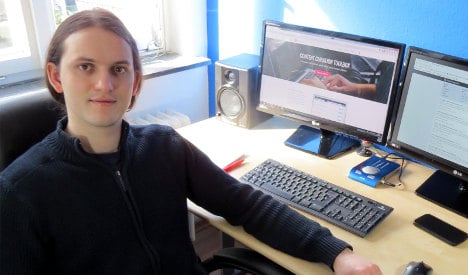Gene Sobolev co-created inboundli, a platform that lets marketers improve the way they share and curate content on social media.
How did you come up with this business idea?
My co-founder, Yuri Prezument, and me are friends from high school. He is now based in Tel Aviv (Israel) while I live in Berlin.
We had a previous startup where we were trying to build up our social media presence by working tirelessly on Twitter, Google+, Facebook, etc. Like many small businesses, we had little time to create content and were relying on curation to establish thought leadership and presence.
We tried many popular workflows and tools, some better than others, but none helped us deliver considerably better content, faster. We then built our own solution which had a different logic from anything on the market and delivered far better results than anything we have tried.
This convinced us to pivot and start inboundli in July 2014. Our algorithms match relevant content to companies based on their sector and analyze social media signals to help share the most engaging content with their audience. The content delivered is personalized and prioritized.
What were the initial challenges? How did you overcome them?
The first challenge was to figure out whether we were solving a significant problem and who would benefit the most from our solution.
We started by reaching out to various professionals on Twitter, asking for interviews and received a surprising number of replies. The problem resonated with marketers across most sectors. So, after about 25 interviews, we knew who we were aiming at and what their requirements are. Another problem was funding.
We are bootstrapping and offered our platform for free until recently. As with many startups, our perception was that an investment is crucial for the survival of our company. However, the deals we were offered were not in our best interest and we decided to change our approach.
This meant laying out a clear customer acquisition strategy and starting to monetize quicker. From how things look now, we will be able to support ourselves in four months. This makes us less dependent on external capital and gives us tangible KPIs and traction to show, should we need funding in the future.
How has the journey been so far?
We created two startups in one year. That changed our attitudes towards our concept as well as towards how startups should function and business models should be made.
We spoke to more people and made better market research altogether.
While offering our service for free, we optimized the product to make it into one that our customers get significant benefits from using. We save marketers a lot of time and help them establish a unique and relevant voice across their social media assets.
Our biggest understanding, however, was realizing the importance of a well-defined sales and marketing framework. We had a very clear product development processes but a sloppy approach to commercialization. Changing our attitudes resulted in enormous benefits and an ability to monetize much faster than initially expected.
How has becoming an entrepreneur changed you, personally?
It has taught us to be honest with ourselves. This implies admitting mistakes and looking at things realistically. We were misleading ourselves with our first startup, although all the signals of imminent failure were there, which cost us time and resources. When things don't seem to be working, they are not working.
It has also taught us to get stuff done; if we don't do it, nobody else will. We enjoy programming/ coding, customer research and product development but have learnt to appreciate the equal importance of sales and marketing, too. There are no shortcuts in entrepreneurship and you have to do whatever it takes, so being flexible while maintaining a strategic vision is critical in my opinion.
Any other personal reflections and/ or message to budding entrepreneurs?
Our first startup had a business-to-customer (B2C) model, but one shouldn’t get into B2C unless one has a radical idea. For business-to-business (B2B) startups, I think it is crucial to think about customers first.
Startups measure themselves, and their success, in terms of investment received and funds raised, which distorts reality. Customers, and even better, revenue are concrete ways to measure success in a B2B startup.
But even more important is to have a great co-founder. I have known Yuri for 15 years, which allows us to work transparently and not to have to worry about founder issues. I have personally witnessed extremely unpleasant situations between founders and if the circumstances allow it, I would advise against starting a startup with a complete stranger.
Are you an entrepreneur in Germany? Contact us and we might feature your story
Sparsh Sharma works as a freelance journalist for The Local and blogs about his experiences in Denmark. You can follow him on Twitter at @sparsh_s.



 Please whitelist us to continue reading.
Please whitelist us to continue reading.
Member comments